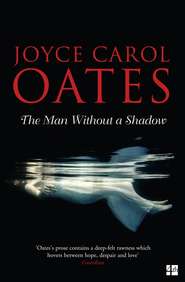По всем вопросам обращайтесь на: info@litportal.ru
(©) 2003-2024.
✖
Carthage
Автор
Год написания книги
2018
Настройки чтения
Размер шрифта
Высота строк
Поля
She was terrified of course. Fussing and fuming over him to deflect her thoughts from the other.
That morning at about 4 A.M. she’d wakened him. When she’d discovered that Cressida hadn’t come home. Since that minute he’d been awake in a way he was rarely awake—all of his senses alert, to the point of pain. Stark-staring awake, as if his eyelids had been removed.
A search. A search for his daughter. A search that was for a missing girl.
These searches of which you hear, occasionally. Often for a lost child.
A kidnapped child. Abducted.
You hear, and you feel a tug of sympathy—but not much more. For your life doesn’t overlap with the lives of strangers and their terror can’t be shared with you.
Was he awake? Or asleep? He saw the steeply hilly forest strewn with enormous boulders as in an ancient cataclysm and from behind one of these a girl’s uplifted hand, arm—a glimpse of a naked shoulder which he knew to be badly bruised . . . Oh Daddy where are you. Dad-dy.
“Lie still. Please. If something happens to you at such a time . . . ”
The voice wasn’t Cressida’s voice. Somehow, Arlette had intervened.
He knew, his wife didn’t trust him. Married for more than a quarter of a century—Arlette trusted Zeno less readily than she’d done at the start.
For now she knew him, to a degree. To know some men is certainly not to trust them.
She was breathless, irritated. Not terrified—not so you’d see—but irritated. The house was crowded with well-intentioned relatives. There were police officers coming and going—their ugly police-radios crackling and squawking like demented geese. There were reporters for local media eager for interviews—they were not to be turned away, for they would be useful. And photos of Cressida had to be supplied, of course.
Coffee? Iced tea? Grapefruit juice, pomegranate juice? With a grim sort of hostess-gaiety Arlette offered her visitors refreshments, for she knew no other way to deal with people in her house.
Somehow, before she’d had a chance to call her sister Katie Hewett, Katie had come to the house. This was by 10 A.M. Katie had taken over the hostess-role and was helping Arlette answer phones—family phone, cell phones—which rang frequently and with each call, despite the evidence of the caller ID, there was the hope that the next voice they heard would be Cressida’s.
Hi there! Gosh! I just saw on TV that I’m “missing”. . .
Wow. Sorry. Oh God you won’t believe what happened but I’m OK now . . .
Except the voice was never Cressida’s. Remarkable, how it was never Cressida’s.
Years ago Arlette would have crawled beside her husband in their bed, in a crisis like this; she would not have minded that her husband had sweated through his clothes, T-shirt and khaki shorts that were now clammy-cool, and smelled of his body; she would have held the anguished man in her arms, to shield him. And Zeno would have gathered his wife in his arms, to shield her. Shivering and shuddering and dazed with exhaustion but together in this terrible time.
Now, Arlette tugged at his hiking boots—so heavy! And the laces needing to be untied. Pulled the boots off his enormous feet seeing that, even in the rush of preparing to leave for the Nautauga Preserve, he’d remembered to put on a double pair of socks—white liner socks, light-woolen socks.
For all his careless-seeming ways, Zeno was a meticulous man. A conscientious man. The only mayor of Carthage in recent decades who’d left office—after eight years, in the 1990s—with a considerable surplus in the city treasury, and not a gaping deficit. (Of course, it was a quasi-secret that Mayor Mayfield had written personal checks for a number of endangered projects—parks and recreation maintenance, Little League softball, the Black River Community Walk-In Clinic.) One of the few mayors in all of upstate New York who, as he’d liked to joke, hadn’t even been investigated, let alone indicted, tried and convicted, for malfeasance in office.
Arlette had asked the young man who’d driven Zeno home in Zeno’s Land Rover what had happened to him in the Preserve, for she knew that Zeno would never tell her the truth.
He’d said, Zeno had gotten overheated. Over-tired. Dehydrated.
He’d said this was why it isn’t a good idea, a family member to be searching for someone in his family who’s been reported lost.
Zeno smiled a ghastly smile. Zeno managed to speak, for Zeno must always have the last word.
OK, he’d try to sleep. A nap for an hour maybe.
Then, he intended to return to the Preserve.
“She can’t be there a second night. We can’t—that can’t—happen.”
He stumbled on the stairs. Didn’t hear Katie speak to him, and didn’t seem to register that WCTG-TV was coming to the house to do an interview with the parents of the missing girl for the Sunday 6 P.M. news, later that afternoon.
Arlette had accompanied Zeno upstairs trying unobtrusively to slip her arm around his waist, but he’d pushed from her with a little snort of indignation.
He’d needed to use the bathroom, he said. Needed some privacy.
“I’m not going to croak in here, hon—I promise.”
This was meant to be humor. Just the word croak.
She’d made a sound like laughter, or the hissing rejoinder to laughter, and turned away, and left the man to his privacy.
Almost, they were adversaries now. Grappling together each knowing what must be done, what should be done, annoyed with the other for being blind, stubborn.
Arlette had known he’d become overheated in the Preserve, he’d had no right to rush off like that tramping through underbrush while she was alone at the house. Waiting for a call—calls. Waiting for something to happen.
After a distracted hour she returned to check on Zeno: he was sprawled on the bed only partly undressed. As if he’d been too exhausted to do more than pull off his khaki shorts and let them fall to the floor.
Sprawled, breathing hoarsely and wetly, through his mouth, like a beached whale might breathe. And his face slack putty-colored, you’d never have guessed had been a handsome face not so long ago.
Unshaven. Wiry whiskers sprouting on his jaws.
Zeno Mayfield was a man who had to be prevented from pushing himself too hard. As if he had no natural sense of restraint, of normal limits.
As, when he’d been a young attorney taking on difficult cases—hopeless cases—unpopular cases; once, unforgivably, taking on a case so controversial, anonymous callers had threatened him and his family and Arlette had worried that some madman might mail a bomb, or affix a bomb to one of their cars. In the name of God think what you are doing, man—one of the anonymous notes had warned.
All Zeno had done, he’d protested, was defend a high school biology teacher who’d been suspended from his job for having taught Darwinian evolutionary theory to the exclusion of “creationism.”
And when he’d been mayor of Carthage, an exhausting and quixotic venture into “public service” that had paid a token salary—(fifteen hundred annually!)—he’d pushed himself beyond what even his avid supporters might have expected of him and saw his popularity plummet nonetheless. The most controversial issue of Zeno’s mayoralty had been a campaign to install recycling in Carthage—yellow barrels for bottles and cans, green barrels for paper and cardboard. You’d have thought that Zeno Mayfield was a descendant of Trotsky! His daughters had asked plaintively Why do people hate Daddy? Don’t they know how funny and nice Daddy is?
Arlette hadn’t lain down beside him. She hadn’t held him tight in her arms. But she’d laid a cloth over his face, dampened with cold water, and he’d pushed it off and clutched anxiously at her hand.
“Lettie—d’you think—he did something to her? And now he’s ashamed, and can’t tell us? Lettie—d’you think—oh God, Lettie . . . ”
YOUR MOTHER AND I chose our daughters’ names with particular care. Because we don’t think that either of you is ordinary. So an ordinary name isn’t appropriate.
He was solemn and dogged trying to explain. She was younger than the age she was now and rudely she laughed.
Bullshit, Daddy. That is such bullshit.
It was like Cressida to laugh in your face. Squinch up her face like a wicked little monkey. Her laughter was high-pitched like a monkey’s chittering and her small shiny-black eyes were merry with derision.
They were in someplace Zeno didn’t recognize. Not in the forest now but in a place meant to be this place—the Mayfield home.
Why is it, when you dream about a place meant to be “home”—or any “familiar” place—it never looks like anything you’d ever seen before?











